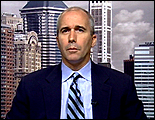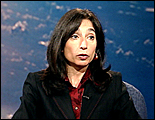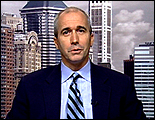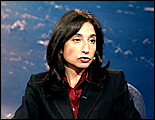PERSPECTIVES . Catholic Church and Islam
BOB ABERNETHY, anchor: More now on Pope Benedict’s remarks about Islam and violence, and the angry reaction by many Muslims. Geneive Abdo is the author of the new book MECCA AND MAIN STREET, about Muslims in America since 9/11. She has reported extensively from the Middle East and is now part of a UN project to improve relations between the West and Islam. David Gibson is also a veteran religion writer and has specialized in coverage of the Catholic Church. His new book is THE RULE OF BENEDICT.
David, why did the pope say what he said?
 DAVID GIBSON (Author, THE RULE OF BENEDICT): Well, Bob, that’s the big question that everybody’s asking, and I think the simplest answer is fundamentally that Benedict has a more skeptical, even critical view of Islam than — certainly than his predecessor John Paul II did. And so when he introduced this rather academic lecture on faith and reason, it was almost natural for him to pull out this 600-year-old story about this emperor questioning whether Islam is inherently violent. I think the other thing that I point out is that Benedict is still “getting his feet” as pope. He gave that address as a theologian, which is his career, but he’s got to realize that now he’s the pope, and his words can have unforeseen consequences.
DAVID GIBSON (Author, THE RULE OF BENEDICT): Well, Bob, that’s the big question that everybody’s asking, and I think the simplest answer is fundamentally that Benedict has a more skeptical, even critical view of Islam than — certainly than his predecessor John Paul II did. And so when he introduced this rather academic lecture on faith and reason, it was almost natural for him to pull out this 600-year-old story about this emperor questioning whether Islam is inherently violent. I think the other thing that I point out is that Benedict is still “getting his feet” as pope. He gave that address as a theologian, which is his career, but he’s got to realize that now he’s the pope, and his words can have unforeseen consequences.
ABERNETHY: Geneive, why was there so much violence and reaction to that?
 GENEIVE ABDO (Author, MECCA AND MAIN STREET): Well, Bob, actually Muslims don’t think that this is natural for the pope to be saying these remarks at all. In fact, they believe that his whole connection between Islam and violence, that that’s something that he should be far more knowledgeable about and not to fall into this trap that has become sort of part of a consensus about the faith.
GENEIVE ABDO (Author, MECCA AND MAIN STREET): Well, Bob, actually Muslims don’t think that this is natural for the pope to be saying these remarks at all. In fact, they believe that his whole connection between Islam and violence, that that’s something that he should be far more knowledgeable about and not to fall into this trap that has become sort of part of a consensus about the faith.
ABERNETHY: But do you feel that there is a connection, that there is something inherent in Islam that condones or encourages violence?
Ms. ABDO: Absolutely not. The Islamic sources in no way condone violence. The militants that we now have become so familiar with that do carry out these acts of violence — in fact, they are distorting the principles of the faith. And so from the Muslim perspective they ask, for example, “Why isn’t Christianity during its periods of violence associated with violence? Why isn’t Judaism associated with violence during its periods and its own history?” And this is what was particularly sensitive for Muslims about these remarks.
ABERNETHY: It seems to many Americans, as you know, that when somebody in the Islamic world makes some violent statement or violent action, attacking a church or something like that, that moderate Muslims just don’t speak out about it.
Ms. ABDO: Well, in fact they are speaking out. The problem is that they’re rarely quoted in the media. So when they issue press releases, when they speak out regularly in their organizations or in their community, the world doesn’t really hear from them. They just really don’t have access. And, of course, they hope that this is something that will change in the future.
ABERNETHY: David, the pope has invited Muslim representatives to come talk to him on Monday (September 25). In this whole area of dialogue, does the pope think that there can be some fruitful outcome of people talking to each other?
Mr. GIBSON: Well, the pope has always been much more skeptical of the benefits of interreligious dialogue — that one of his first acts as pope was to downgrade the Vatican office of interreligious dialogue and, in fact, he sent the Vatican’s top expert in Islam off to a diplomatic posting. Again, if he had had somebody reading over his shoulder, perhaps, before he delivered the lecture, none of this would have happened. But I think there’s a real — there are two main issues here.
There’s the theological dialogue on what Islam is and how it relates to Christianity and Catholicism, and then there’s the more political and diplomatic issue as to what Muslims are doing in certain countries and why there is persecution of Christians. And he’s really got a lot of work to do, I think, on both sides, but he seems to have made a remarkable, for him, commitment to try and make up for this.
ABERNETHY: Geneive, one of the issues between Christianity and Islam is why Saudi Arabia and other Muslim groups can build a big mosque in Rome, but Christians can’t build a church in Saudi Arabia. Why is that?
Ms. ABDO: Well, in fact, there are many churches across the Arab world, and there’s a long history of Christian minorities living very peacefully with Muslims. The current tensions that we see now are actually a response to global events, to U.S. policies in all the countries that we know about and that’s really…
ABERNETHY: So it’s not a religious argument, it’s a political argument?
Ms. ABDO: Absolutely. It’s not about a religious difference. It’s about recent political developments, because, don’t forget, this history, this tension is very new. In Lebanon, for example, Christians have lived alongside Muslims for centuries. So this is really a response to global events.
ABERNETHY: David, the pope is supposed to go to Turkey on a visit the end of November. What kind of reception do you think he’ll have after all this?
 Mr. GIBSON: Well, there’s a great uncertainty about that trip and certainly what reception he will get. If you’ve got tens or hundreds of thousands of angry Muslims in the streets demonstrating against him, that’s going to be a watershed moment, I think. The Vatican and the popes have always been seen as an honest broker, frankly, between the West and the Arab Muslim world. And if that’s going to no longer be the case, I think future dialogues, which are vibrant in many areas between Catholics and Christians and Muslims, is going to be the arena for future talks and progress.
Mr. GIBSON: Well, there’s a great uncertainty about that trip and certainly what reception he will get. If you’ve got tens or hundreds of thousands of angry Muslims in the streets demonstrating against him, that’s going to be a watershed moment, I think. The Vatican and the popes have always been seen as an honest broker, frankly, between the West and the Arab Muslim world. And if that’s going to no longer be the case, I think future dialogues, which are vibrant in many areas between Catholics and Christians and Muslims, is going to be the arena for future talks and progress.
ABERNETHY: Geneive?
 Ms. ABDO: Dialogue is absolutely important, as David mentioned. But I think that now, particularly given everything that’s happened over the last several years, that this dialogue has to come from a world religious leader with the pope’s standing.
Ms. ABDO: Dialogue is absolutely important, as David mentioned. But I think that now, particularly given everything that’s happened over the last several years, that this dialogue has to come from a world religious leader with the pope’s standing.
ABERNETHY: And with politicians involved?
Ms. ABDO: And with politicians. It can’t just be a dialogue about religion. It has to be a dialogue that addresses all the grievances, the political grievances that Muslims have around the world.
ABERNETHY: Genieve Abdo and David Gibson, many thanks to you both.






